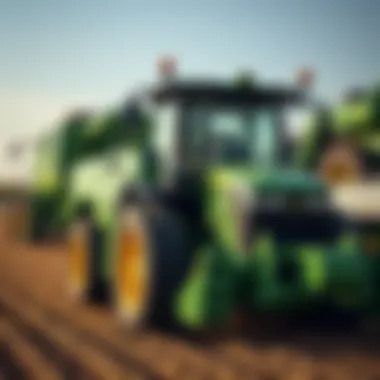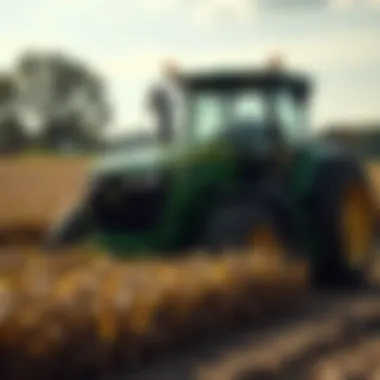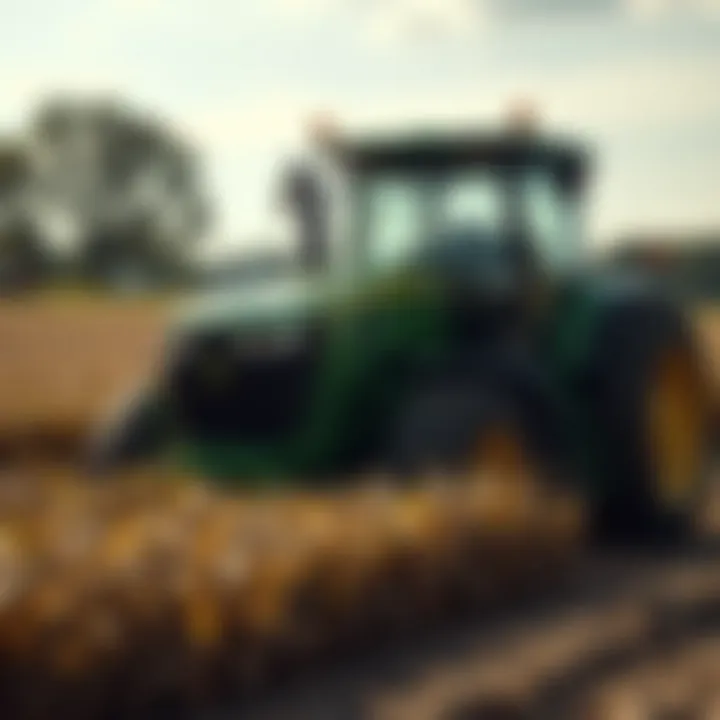John Deere's Impact on Agriculture in Logansport


Intro
In the heart of Indiana, Logansport stands as a beacon for agricultural innovation, largely shaped by the enduring influence of John Deere. As one of the premier brands within the agricultural sector, John Deere has been more than just a name on machinery; it embodies a tradition of quality, sustainability, and community support. Farmers and agricultural enthusiasts alike look to John Deere not merely for equipment, but for a partnership that extends beyond the sale of tractors and implements. This piece aims to delve into how John Deere's presence in Logansport intertwines with the local agricultural landscape, tracing its history, innovations, and the tangible impact on the community.
Topic Overview
Definition and Importance
The term "agricultural landscape" does not just pertain to the physical fields and farms. It incorporates social, economic, and technological dimensions that define how farming is practiced in a region. John Deere’s presence in Logansport has redefined what it means to farm effectively, by introducing advanced tools and practices that enhance productivity while emphasizing sustainability. More than just farming equipment, John Deere represents a commitment to improving local agriculture, making their role paramount for the farmers in this area.
Brief History and Evolution
Logansport’s relationship with John Deere began decades ago when local farmers first recognized the durability and efficiency of its machinery. Over the years, John Deere grew alongside these farmers, evolving from producing basic tractors to implementing cutting-edge technology, like GPS guidance systems and automated equipment. Understanding this evolution is essential, as it highlights how John Deere has adapted not just to the changing landscape of agricultural machinery, but also to the shifting needs of farmers around Logansport.
- Initial entry into Logansport's market
- Adoption of technological advancements
- Community-based initiatives and partnerships
As we explore the key techniques and innovations introduced by John Deere, one can see the concrete impact they have on farming practices. Their focus on sustainability and advanced agronomic technologies not only helps farmers maximize yields but also ensures that agricultural methods remain viable for future generations.
Intro to John Deere
In examining the intricate relationship between John Deere and Logansport, it becomes clear that this company plays a pivotal role in shaping local agriculture. Understanding John Deere's significance goes beyond mere machinery; it's about how this iconic brand influences the daily lives of farmers in the area. From innovative technology to community engagement, exploring John Deere's contributions reveals a tapestry woven into the fabric of Logansport's agricultural landscape.
Historical Background of John Deere
Founded in 1837, John Deere emerged from the vision of a blacksmith named John Deere himself. Notably, the company began with the production of plows designed to meet the needs of farmers in the American Midwest. This was particularly important during a time when farming was essential for survival. Instead of the typical cast-iron plows that often struggled in the Midwest's sticky soil, Deere crafted a polished steel plow that would glide through the earth with ease. This innovation marked the beginning of a legacy.
As years rolled on, John Deere grew into a global leader in agricultural machinery, thanks to continual enhancements and responsiveness to farmers' needs. For instance, the company diversified its product line from plows to a wide array of equipment, including tractors, combines, and hydraulic implements. Each advancement reflected the changing demands of the agricultural community, paving the way for John Deere to remain relevant through generations.
Company Milestones and Achievements
John Deere's journey is marked by significant milestones that underline its commitment to innovation and quality. Early in the 20th century, Deere introduced the first gasoline-powered tractor, which revolutionized farming by allowing farmers to work larger plots more efficiently. Fast forward to 1963, John Deere made history by launching the 4010 tractor equipped with a diesel engine, enhancing fuel efficiency significantly.
In recent years, the company has embraced the age of technology with initiatives such as precision agriculture, which combines advanced analytics with real-time data to optimize farming practices. Notably, new tools like the John Deere Operations Center and Eco-Ag Technology aim to propel productivity and sustainability for farmers, ensuring that their methods align with modern agricultural practices.
John Deere’s steadfast dedication doesn't stop at machinery. The company has also achieved recognition for community involvement, including educational initiatives and support for local farming programs, further entrenching itself as a cornerstone of Logansport’s agricultural advancement.
"John Deere is not just a name; it's a promise to farmers that we understand their challenges and are here to assist them through every season of their labor."
In brief, the historical context and key achievements of John Deere provide essential insights into not only the company's operations but also its overall significance to Logansport's vibrant agricultural economy. Understanding this backdrop sets the stage for delving deeper into the ongoing impact of John Deere's presence in the region.
Overview of Logansport
Logansport, a city nestled in the heart of Cass County, Indiana, holds a pivotal role within the agricultural landscape of the state. This overview will explore how geographical traits and demographic elements have contributed to its identity as an agricultural hub. Understanding Logansport is crucial as it sets the stage for comprehending John Deere’s influence in the region.
Geographic and Demographic Context
The geographic layout of Logansport reveals fertile stretches of land that are ripe for farming. The city lies along the banks of the Eel River, offering a water resource that is indispensable for farming activities. Additionally, its proximity to major highways facilitates easy transportation of goods to and from farms, connecting local producers to broader markets.
Demographically, Logansport boasts a diverse population of around 18,000 residents. A significant portion of this population is involved in agriculture, whether as local farmers, suppliers, or service providers. The community's agricultural roots run deep, with generations dedicated to the trade. This demographic composition not only amplifies the importance of agricultural innovations, such as those offered by John Deere, but it also fosters a sense of community among those who work in the sector.
"Logansport truly embodies the spirit of agriculture, bringing together tradition and innovation hand in hand."
Agricultural Landscape of Logansport
Logansport is framed by fields and farms, representing various agricultural productions including corn, soybeans, and livestock. The agricultural landscape here is shaped by both traditional farming methods and new technological advancements. Local farmers are constantly looking for ways to improve efficiency and productivity. This demand aligns perfectly with what John Deere brings to the table.
The agricultural richness of Logansport not only supports local economy but also contributes to the regional food supply. The average farm in the area operates many acres of land and can rely on the expertise from John Deere to utilize modern machinery and precision agriculture tools. John Deere’s commitment to developing equipment designed for local conditions allows farmers in Logansport to adapt to changing markets and environmental challenges. Furthermore, with innovations in sustainable farming practices, Logansport remains a beacon for those looking to find harmony between productivity and environmental responsibility.
In summary, the geographic and demographic elements serve as a backdrop for understanding the agricultural imperatives of Logansport. The landscape is fertile not just in soil, but in opportunity, making it a compelling focus for John Deere’s operations and community involvement.


John Deere's Operations in Logansport
The presence of John Deere in Logansport is not just a facet of the company’s business; it embodies a commitment to enhancing agricultural practices and ensuring local farmers have access to quality equipment and services. The operations in this region act as a cornerstone for countless agricultural activities that sustain the local economy and culture. As one delves deeper into the subject, it becomes evident that John Deere’s role extends beyond mere equipment supply.
Local Agricultural Equipment Supply
In Logansport, John Deere offers an array of agricultural equipment designed specifically for local farmers. This includes tractors, combines, and various implements that simplify day-to-day farming chores. When uncovering the significance of local supply chains, it’s crucial to note that proximity reduces downtime for farmers. With equipment sales outlets situated nearby, farmers can quickly obtain parts or machinery, significantly boosting productivity during peak seasons.
Moreover, the sales team in Logansport is equipped with in-depth knowledge about the region's agricultural needs, allowing them to provide tailored advice. This dedicated approach ensures that every farmer can find the right machinery suited for their specific crop types and soil conditions. Having community-oriented sales representatives creates a rapport that fosters trust, making it easier for farmers to invest in new technologies.
Given that Logansport's agriculture often relies on time-sensitive operations like planting and harvesting, having this local supply guarantees that farmers won’t be caught off guard should an urgent need arise. They can rely on John Deere’s vast inventory to maintain optimum farming efficiency.
"John Deere's operations in Logansport provide a lifeline for farmers, presenting them with not just machinery, but a network of support that they can trust."
Sales and Service Impact
The influence of John Deere in Logansport is especially pronounced in its sales and service arenas. The services offered help maintain farmers' equipment, ensuring that machinery runs at peak efficiency throughout the year. Regular maintenance checks, quick-service repairs, and parts replacements become less daunting with John Deere’s team readily available.
Farmers often face challenges during critical farming periods. In response, John Deere offers prompt service calls and quick turnarounds on repairs. This ability to respond swiftly not only mitigates potential losses due to equipment failure but fosters a sense of reliability within the farming community. When farmers know they can depend on swift service, they can plan their farming activities with greater confidence.
Additionally, John Deere runs workshops and training sessions aimed at ensuring that farmers can maximize the use of the equipment, providing valuable insight into the latest technologies and practices. By educating the community on advanced machinery, John Deere contributes to raising the level of agricultural standards in Logansport. When discussing the overall impact, one can see that the convergence of sales and service defines the local agricultural landscape by enhancing both productivity and resilience against seasonal challenges.
Innovative Technologies by John Deere
In the realm of agriculture, technology acts like a mighty river; it carves new paths, floods old methods, and ensures that farmers stay afloat amid the ebb and flow of changing demands and practices. John Deere's innovative technologies are no exception. They not only redefine productivity but also enhance sustainability in farming—a critical factor in today's environmentally sensitive climate.
Precision Agriculture Solutions
When it comes to farming, precision is the name of the game. John Deere has made significant strides in precision agriculture solutions, allowing farmers to optimize their resources and increase yields with data-driven decisions.
- Guidance Systems: John Deere offers GPS-guided tractors and equipment, minimizing overlap in applications like planting and spraying. This not only saves time but also prevents resource waste; every drop of fertilizer or pesticide counts.
- Field Mapping Technologies: Armed with advanced mapping and analysis tools, farmers can observe variations in their fields. This knowledge allows for more targeted interventions, addressing unique conditions and needs specific to each area.
- Yield Monitoring: With sophisticated yield monitoring systems installed on their equipment, farmers can gather real-time data about their crops. This insight leads to better planning for future planting seasons, ensuring that each crop is as productive as possible.
"Precision agriculture technologies represent the next wave in farming, making operations not just efficient, but smart," says an industry expert.
There's no doubt that these precision techniques help in making informed decisions, which ultimately lead to enhanced productivity and improved profitability for local farmers in Logansport.
Sustainable Farming Equipment
It's no secret that sustainability is a hot topic, especially in agriculture, where the balance between productivity and environmental impact is a juggling act. John Deere’s commitment to sustainable farming equipment is not merely a pitch; it reflects a genuine interest in preserving the land for future generations.
- Eco-Friendly Machinery: John Deere has been actively working to produce machines that reduce emissions. Their latest diesel engines and electric models prioritize fuel efficiency, contributing to lower carbon footprints.
- Smart Irrigation Solutions: Water is a precious resource, and John Deere’s innovations in smart irrigation ensure that every drop is used wisely. These systems are designed to apply water only where, and when, it is needed, cutting down on excess usage.
- Recyclable Materials: John Deere emphasizes using recyclable materials in their machinery, showcasing a commitment to circular economy principles. Not only does this reduce waste, but it also fosters innovation in product design and longevity.
The effort put into sustainable farming equipment reflects a deep-rooted understanding that the health of our environment directly correlates with agricultural success. As Logansport farmers integrate these technologies, they find themselves part of a bigger movement geared toward responsible farming.
Community Engagement and Support
Community engagement and support play a vital role in the overall impact John Deere has on the Logansport area. It is not merely about selling agricultural machinery; it involves fostering relationships with local farmers and contributing positively to the community's agricultural and educational landscape. Through various initiatives, John Deere positions itself not just as a supplier but as a partner in growth, education, and sustainability.
Educational Initiatives and Workshops
John Deere takes education seriously, especially when it comes to empowering local farmers with the knowledge and tools necessary to succeed in an ever-evolving agricultural climate. Workshops are frequently organized, focusing on topics ranging from the latest farming techniques to the use of advanced machinery. These gatherings serve multiple purposes:
- Skill Enhancement: Farmers get hands-on experience with new technologies and best practices.
- Networking Opportunities: Local farmers can connect with each other, sharing experiences and strategies that have worked for them.
- Resource Accessibility: John Deere representatives provide valuable insights about maintaining equipment and optimizing performance, making guidance readily available.
Participation in these initiatives can lead to improved efficiency and productivity in farming practices. As farmers learn to integrate innovative methods into their work, the entire community reaps the benefits. It’s not just a workshop; it’s a step toward building a resilient agricultural community.
Partnerships with Local Farmers
Strengthening partnerships with local farmers is at the heart of John Deere's community engagement strategy in Logansport. These partnerships are built on mutual respect and understanding, paving the way for collaborative projects that can advance agricultural methods. Key aspects of these partnerships include:
- Cooperative Research and Development: Working alongside farmers, John Deere collects data relevant to regional needs, ensuring that their products consistently meet the demands of local agriculture.
- Feedback Mechanisms: Farmers have a voice in product development, allowing them to share firsthand experiences and suggest improvements based on real-world use cases.
- Support Systems: John Deere also plays an advisory role, helping farmers navigate market challenges or adopt new technologies seamlessly.


The emphasis on these local alliances translates into tangible outcomes, such as increased crop yields or decreased downtime due to machinery failure.
"A strong community is based on collaboration, and John Deere makes sure that local farmers feel equipped and supported every step of the way."
In summary, John Deere's dedicated efforts in community engagement and support in Logansport not only enhance relationships but also foster an environment of growth and education. By investing in local initiatives and reinforcing partnerships with farmers, the company seeks to lead by example, demonstrating that the agricultural landscape can be rich with opportunities when collaboration is prioritized.
Economic Contributions of John Deere
When considering the role of John Deere in Logansport, one cannot overlook the significant economic contributions the company has made to the local community. This extends beyond mere sales figures; it includes job creation, contributions to local markets, and the overall development of the agricultural sector in the area. Understanding these elements becomes crucial as it reveals how intertwined John Deere's operations are with the fabric of Logansport.
Job Creation and Local Economy Growth
John Deere's presence in Logansport has not only enhanced the availability of agricultural machinery but has also been a catalyst for job creation. The company directly employs a considerable workforce in the area, creating opportunities for local residents. This ranges from skilled manufacturing positions to various administrative and support roles that help the business run smoothly.
Moreover, the impact goes further than just direct employment. Many businesses in the supply chain benefit from John Deere's operations.
- Parts suppliers: Local suppliers that provide parts and services are vital. They thrive because of John Deere's demand for high-quality components.
- Service providers: Mechanics and maintenance services see increased business thanks to the machinery that farmers need to upkeep.
- Retail and Wholesale: Local hardware stores and equipment dealers also gain from increased foot traffic and sales that come with truckloads of John Deere machinery.
According to estimates, for every job created at John Deere, several additional jobs are supported in the surrounding community. This multiplier effect significantly boosts Logansport's local economy, promoting prosperity and stability over time.
Impact on Local Agricultural Productivity
The effect of John Deere on agricultural productivity in Logansport is tangible. The advancements in technology and the array of equipment offered have led to notably improved farming practices. When local farmers utilize John Deere machinery, they often experience:
- Higher Efficiency: Modern tractors and harvesting equipment are designed to maximize productivity. This means that farmers can cover more ground in less time, leading to higher crop yields.
- Precision Farming: With the introduction of technologies like GPS-guided tractors, farmers can optimize their planting and harvesting strategies. This precision reduces resource waste and enhances the quality of produce.
- Sustainability Improvements: Many of John Deere’s products are designed with environmental responsibility in mind. By supporting practices such as no-till farming or cover cropping, the company enables farmers to adopt more sustainable practices, contributing to long-term soil health.
As farmers report increased yields and lower operational costs, the economic viability of local agriculture improves. This, in turn, creates a virtuous cycle where increased productivity translates into higher incomes, allowing farmers to invest back into their businesses and the local economy.
"The presence of John Deere has transformed agriculture in Logansport, enhancing productivity and promoting economic growth through innovation and job creation."
In summary, John Deere's contributions to Logansport resonate well beyond their factory walls. They are not simply selling machinery; they are fostering an ecosystem that supports agricultural advancement and community prosperity. As the company continues to grow and innovate, the potential for further economic impact remains significant.
Environmental Responsibility
Understanding environmental responsibility is crucial in the context of John Deere's operations in Logansport. As agriculture increasingly integrates technology and modern practices, there’s a pressing need for companies like John Deere to prioritize sustainability. This responsibility encompasses how their manufacturing processes impact the environment, the ecological effects of the farming equipment they produce, and their broader role within the community.
By focusing on eco-friendly practices, John Deere not only contributes to preserving the environment but also enhances its brand image among consumers who are more conscientious about sustainability. The benefits of these practices can lead to:
- Reduced carbon footprint and emissions
- Enhanced efficiency in resource usage
- Improved public perception, aligning with consumer values
Furthermore, adopting environmentally responsible policies is also about future-proofing the company. As regulations tighten and public awareness increases, companies that proactively engage in sustainable practices stand to gain a competitive edge. Not to forget that these practices can translate into long-term cost savings for the farmers who depend on John Deere's machines.
"In the age where climate concerns loom large, companies are not just evaluated by their product output but by their ecological footprint."
Eco-Friendly Practices in Machinery Production
John Deere has been making significant strides toward implementing eco-friendly practices in its machinery production. The company has recognized the importance of reducing waste and emissions while still producing high-quality agricultural machines. Some key initiatives they’ve adopted include:
- Material Sourcing: Using recycled materials when possible to minimize the creation of new resources, John Deere aims to build machinery that can sustain agricultural activities without depleting local ecosystems.
- Energy Efficiency: The production facilities are increasingly utilizing renewable energy sources, like solar or wind power, to offset traditional energy consumption. By investing in energy-efficient machinery and technologies, John Deere fulfills its role in reducing dependency on fossil fuels.
- Waste Reduction Programs: Implementing comprehensive recycling programs within manufacturing plants helps divert waste from landfills. For instance, excess materials that would typically be discarded are reclaimed and processed for future use.
These practices not only contribute to a healthier planet but also demonstrate John Deere's commitment to pushing boundaries in sustainable agriculture. They look beyond just the current operational framework, embracing methods that allow them to lead by example.
Sustainability Initiatives in the Community
In the heart of Logansport, John Deere has become a pillar by engaging in sustainability initiatives that empower local farmers and enhance environmental health. Their involvement in the community helps foster a culture of responsibility and sustainability.
Initiatives include:
- Educational Programs: John Deere organizes workshops for local farmers, focusing on sustainable practices, precision agriculture, and innovative farming techniques. These workshops not only impart valuable knowledge but help build a community of informed growers.
- Support for Local Projects: They often collaborate with local organizations to promote community gardens and reforestation efforts. John Deere’s investment in these local projects reflects their belief in nurturing the land, quite literally and figuratively.
- Grants and Funding: Through various outreach programs, they provide financial support to innovative farming methods that prioritize sustainability, aiding in the development of practices that benefit both farmers and the environment.
Engaging directly with the community allows John Deere not only to enhance its brand presence but create a legacy of sustainability that impacts future generations. This commitment to both agriculture and environmental responsibility supports a balanced ecosystem that the community can thrive in.


Challenges Facing the Agricultural Sector
The agricultural sector, a cornerstone of Logansport's economy, faces numerous hurdles that can jeopardize its growth and sustainability. These challenges are not just passing storms; they are becoming fixtures in the agricultural landscape, demanding that farmers and corporations like John Deere adapt or risk being left behind. Understanding these obstacles is crucial for anyone involved in agriculture, from seasoned farmers to new entrants in the field. By delving into the specific challenges, we can glean insights that might just pave the way for innovative solutions.
Market Fluctuations and Their Influence
In agriculture, prices don’t just ebb and flow—they can take wild swings. From commodity crops like corn to niche products like organic vegetables, market fluctuations can significantly impact farmers' bottom lines. For instance, a sudden spike in oil prices doesn't merely raise costs; it can send shockwaves through farmers' operating budgets, affecting everything from fuel to fertilizers.
- Short-Term Price Volatility: Unexpected weather patterns or reports of pest infestations can lead to sudden drops in market prices. Farmers find themselves at crossroads, deciding whether to invest in more seed or hold back in hopes of a rebound.
- Long-Term Trends: Economic shifts, such as a shift towards plant-based diets, can reshape demand for certain crops over time, forcing farmers to rethink their strategies.
"Market fluctuations can can mean the difference between profit and loss for farmers, making risk management essential."
Navigating these market changes is not just a matter of luck; it requires a keen eye for industry trends and an ability to pivot quickly. For John Deere, understanding these trends is vital to align their equipment offerings with the evolving needs of farmers facing unpredictable markets.
Technological Adaptation Challenges
As we zoom into the technological aspects of agriculture, a clear picture begins to emerge of the hurdles that farmers encounter. While innovation can drive efficiency, the pace of technological advancement can be overwhelming, especially for those set in traditional farming ways.
Moreover, there's an economic factor that cannot be ignored. Investing in the latest precision farming equipment can be costly, and not every farmer has the capital to make that leap. That said, some key challenges include:
- Cost of Adoption: New technologies come with hefty price tags. Farmers must weigh whether the potential increase in yield justifies the upfront costs.
- Training and Familiarization: Even after acquiring new tech, it takes time for farmers to become comfortable and proficient with these tools. This learning curve can slow down operations during critical planting seasons.
- Integration with Existing Practices: Farmers often face hurdles integrating new technologies with longstanding practices. The success of these tools can hinge on how seamlessly they mesh with existing operations.
To be competitive, farmers in Logansport, empowered by the innovations from John Deere, must rise to these challenges. The future of agriculture hinges on blending traditional wisdom with cutting-edge technology, navigating through both market uncertainties and the complexities of modernization.
Future Prospects for John Deere in Logansport
As John Deere continues to forge its path in Logansport, understanding its future prospects becomes vital for both local farmers and the broader agricultural community. New technological advancements, shifting market demands, and a growing emphasis on sustainability present unique opportunities and challenges for the company. This section dives deep into how John Deere plans to adapt, grow, and maintain its significant role in the agricultural sector here.
Expansion of Services and Offerings
John Deere's evolution in Logansport cannot be separated from its commitment to expanding services and offerings tailored to the needs of local farmers. Over the past several years, the company has strategically introduced various agricultural technologies designed to enhance efficiency and productivity. These tools are more than mere machinery; they are solutions aimed at real-world challenges faced by farmers.
- Precision Agriculture Tools: John Deere has been ramping up its offerings in precision agriculture, which includes GPS-guided tractors and yellow-flag alerts for crop health. Such advances help farmers make informed decisions, saving both time and resources.
- Portfolio Diversification: From drones that monitor crop conditions to a broader range of smart machinery, diversifying its product suite allows John Deere to cater to different scales of farming operations. This adaptability ensures that local farmers can find the right fit for their specific needs whether they’re running a small family farm or a large agricultural enterprise.
- Enhanced Support and Maintenance: Recognizing that machinery downtime can dramatically affect productivity, John Deere is investing in rapid support and service network. An improved response time for repairs and maintenance go a long way toward building trust within the farming community.
Such expansions show that John Deere is not just about selling equipment but also fostering lasting partnerships with farmers that can weather the storms of changing agricultural landscapes.
Long-Term Vision and Strategic Goals
Looking ahead, John Deere’s long-term vision and strategic goals are pivotal to ensuring its continued relevance in Logansport. The integration of farmer feedback into long-term planning demonstrates a proactive approach to business – one that prioritizes the needs and concerns of its customers.
"By staying connected with local farmers, we can adapt and innovate in ways that directly respond to their evolving challenges and aspirations."
- Sustainability Focus: John Deere is committed to reducing its carbon footprint through eco-friendly manufacturing processes and machinery. This aligns with the growing awareness among farmers about sustainable practices, making it a win-win situation.
- Investing in R&D: Continuous investment in research and development ensures that new products are not only up to par with current technology but set to lead the market. Future machines will likely feature even smarter capabilities, from autonomous operations to advanced data analytics helping farmers make better decisions.
- Community Collaboration: Part of their strategy involves collaborating with local entities and academic institutions to harness new ideas—research and innovation need to meet local agricultural needs. By working closely with agricultural experts, John Deere can tailor its approach to the distinct qualities of Logansport's farming community.
As John Deere fine-tunes its services and boldly strides towards the future, the long-term vision they’ve laid out is not just about expanding their market footprint—it speaks to their commitment to agriculture as a whole, ensuring that farmers are not left out in the quest for innovation.
The End
The topic of Conclusion in this article is crucial as it ties together the various strands of John Deere's influence on the agricultural landscape in Logansport. As we dissect the company’s contributions, it becomes clear that John Deere is not just a manufacturer of agricultural machinery but a vital component of the local community. The underlying narrative throughout various sections accentuates the role of John Deere in enhancing agricultural best practices, driving technological innovation, and fostering community development.
Recap of Key Themes
In reviewing the key themes, several points come to the forefront:
- Historical Context: Understanding John Deere's legacy lays the groundwork for recognizing its significance in Logansport today.
- Local Engagement: John Deere's commitment to education and partnerships with local farmers reflects its deep-seated roots in the community.
- Technological Advances: Precision agriculture and sustainable practices highlight how John Deere leads the charge towards a progressive farming future.
- Economic Impact: The job opportunities and economic stimulation brought about by John Deere illustrate its importance in local growth.
By synthesizing these themes, we see an intricate tapestry where John Deere not only meets the needs of farmers but contributes positively to the entire community fabric.
Looking Ahead for Agricultural Innovation
As we gaze into the future of agricultural innovation, the following considerations emerge:
- Expanding Services: There is a noticeable trend towards diversification in service offerings, enabling farmers to adopt the latest technologies more readily.
- Sustainability Focus: A long-term commitment to eco-friendly practices will only deepen, as pressure mounts for producers to embrace greener methodologies.
- Community Integration: Engagement initiatives are likely to increase, promoting stronger ties with local communities and ensuring that agriculture evolves in tandem with societal needs.
- Research and Development: Investment in R&D equips John Deere to continually adapt to challenges such as climate change and market fluctuations.
"The future of farming isn’t just about the machines; it’s about how those machines enhance the relationship between technology, farming, and community."
Ultimately, these insights suggest that John Deere will not just adapt to changes but spearhead innovations that will redefine agriculture in Logansport for generations to come.



